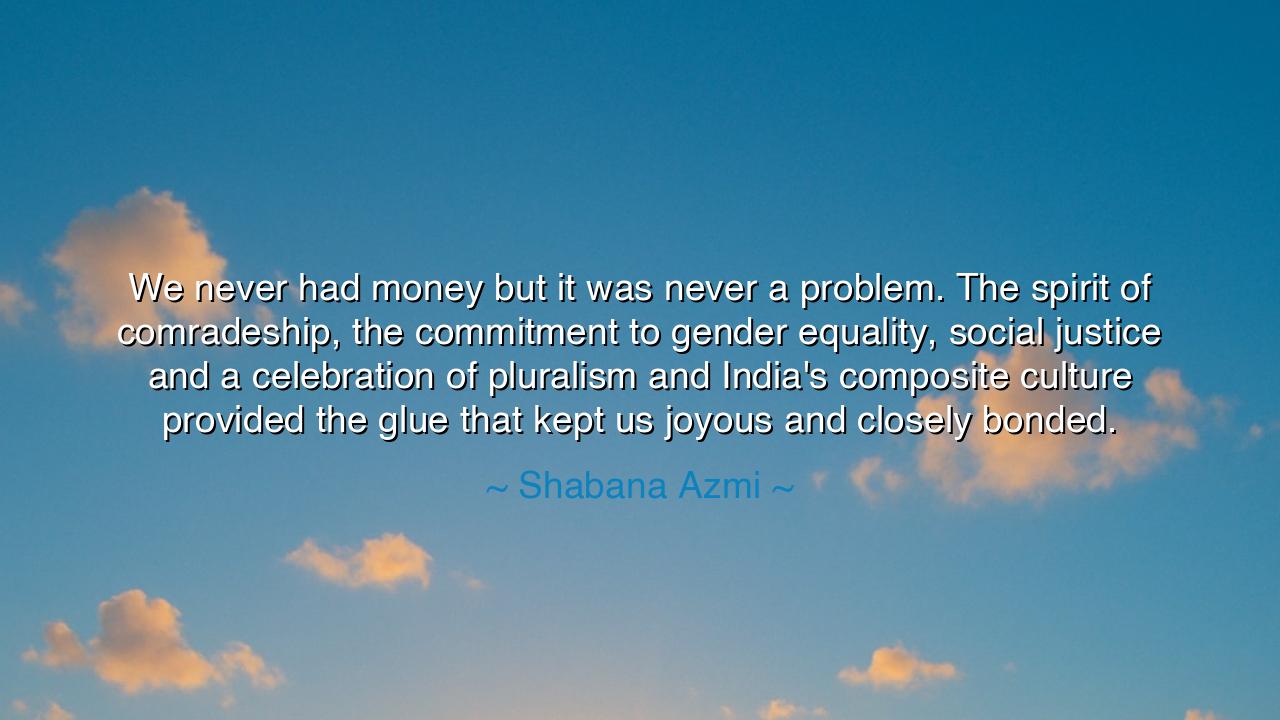
We never had money but it was never a problem. The spirit of
We never had money but it was never a problem. The spirit of comradeship, the commitment to gender equality, social justice and a celebration of pluralism and India's composite culture provided the glue that kept us joyous and closely bonded.






“We never had money but it was never a problem. The spirit of comradeship, the commitment to gender equality, social justice, and a celebration of pluralism and India’s composite culture provided the glue that kept us joyous and closely bonded.” — Thus spoke Shabana Azmi, an artist and humanitarian whose voice carries the depth of a thousand lives lived in empathy. In her words dwell not nostalgia for simplicity alone, but a sacred remembrance of values greater than wealth — of comradeship, of equality, of justice, and of unity in diversity. This quote is not merely a recollection of a childhood without riches; it is a hymn to the invisible treasures that nourish the human soul when the purse is light but the spirit is full.
In her reflection, Azmi speaks of a time when community was the wealth of the people. Theirs was not a household of gold and grandeur, but of ideals — of minds aflame with hope and hearts alive with compassion. It is a reminder that money alone cannot purchase joy, nor can poverty diminish the richness of a shared dream. In an age where possessions often replace purpose, her words rise like a song from the ancients, calling us back to the truth that human beings are bound not by coin, but by common cause and kindred spirit.
The spirit of comradeship she speaks of is the golden thread that weaves individuals into a living fabric of solidarity. In her youth, she was surrounded by thinkers, writers, and activists — men and women who believed that life’s true purpose was to serve humanity. Among them were her parents, the poet Kaifi Azmi and the actress Shaukat Kaifi, who lived not for luxury but for liberation, for art that could uplift and awaken. Their home was a gathering place for the poor, the poets, and the revolutionaries alike — a house without riches, yet rich in the currency of compassion. This was the world in which Shabana learned that the worth of a person lies not in what they possess, but in what they stand for.
The mention of gender equality and social justice reveals the foundation upon which her joy was built. It was not enough to live well; one had to live rightly. In that household, every meal was shared equally, every voice heard with dignity. Men and women stood side by side, not as rivals but as allies in a shared quest for freedom and fairness. In that environment, the seeds of her lifelong advocacy for women’s rights were sown. Like the great Savitribai Phule, who opened schools for girls in a time of darkness, Azmi too became a torchbearer for equality — proving that to uplift others is the purest form of abundance.
And yet, what gives her words their lasting radiance is her invocation of pluralism and India’s composite culture. For in this diversity — in the mingling of languages, faiths, and traditions — lies the soul of the nation itself. She speaks of a world where a Hindu would break bread with a Muslim, where art transcended creed, where love crossed boundaries of birth and belief. This celebration of pluralism was not mere tolerance; it was reverence for difference — a joyous recognition that unity is not found in sameness, but in harmony. It was this faith in the many becoming one that kept her community closely bonded, unshaken even when material comforts were few.
From history, we may look to Mahatma Gandhi, who lived in simplicity yet inspired millions through his moral wealth. His ashram, much like Azmi’s world, was sustained not by riches but by shared purpose and mutual respect. People of all castes and faiths worked side by side, bound by truth and nonviolence. In both Gandhi’s time and Azmi’s memory, we see a vision of society where joy springs not from possessions, but from participation — from belonging to something greater than oneself.
Let this, then, be the lesson to all who hear: the measure of life is not the weight of one’s gold, but the depth of one’s connections. Seek comradeship, not competition; nurture justice, not jealousy. In your home, let kindness be your inheritance; in your work, let fairness be your creed. Rejoice in the diversity that surrounds you, for it is the music of creation itself. Wealth fades, but the spirit of unity — born of equality, compassion, and shared humanity — endures beyond all ages.
Thus remember the wisdom of Shabana Azmi: that joy does not dwell in luxury, but in values lived boldly and together. A community united by love and justice is richer than any empire built on greed. To live in this truth is to rediscover what it means to be human — to walk not alone, but hand in hand, beneath the great sky of our shared existence.






AAdministratorAdministrator
Welcome, honored guests. Please leave a comment, we will respond soon